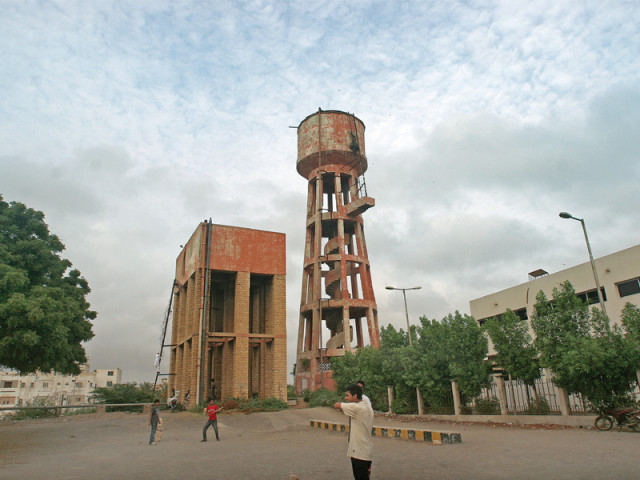Water crisis at Jinnah hospital forces patients to run from pillar to post
A senior official says water is diverted to laundries working on a commercial basis.

Officials accuse the JPMC of diverting water from its tank to laundries working on a commercial basis.
PHOTO: ATHAR KHAN/EXPRESS
A girl complains, “There is no drinking water inside the wards. We have to fetch it from the mosque or a nearby restaurant. The doctors and paramedic staff purchase mineral water, but we can barely afford to buy medicines,” she said.
A patient, Habib Khatoon, who has come from Hyderabad, spends her days on footpaths in front of the hospital as the doctors have yet to admit her to a ward. She has been suffering from a throat problem. Khatoon says, “We came here three days ago. But, since the endoscopy machine is not working properly we were asked to wait for a few days. I am really worried about my mother who gets water from the restaurant across the road,” she said.

In the 28 wards of the hospital, around 1,300 patients are admitted along with their attendants and five thousand cases of OPD are dealt with, but hardly two to three water coolers are functioning and that too occasionally.
A doctor said that there is shortage of water in the toilets also. “Sometimes, we cannot visit patients inside wards because of a foul stench coming from the toilets,” she said. The doctors bring water from their homes, while the paramedic staff gets it from a water cooler at the ICU, she said.
Patients have also complained about the overflowing lavatories in the wards. “We had no idea that one of the largest public hospitals in Pakistan would be in such a pathetic condition. It has become difficult for us to stay in this place,” said Bashir Khan.
A senior official told The Express Tribune that water was being diverted to laundries where clothes and bed sheets were washed. “These laundries are also working on a commercial basis. Many people and dry cleaners from the surrounding areas bring their clothes for dry cleaning,” he said. The water consumption has increased immensely but the administration has not taken any steps to revamp the system built in 1950s, he regretted.

Jinnah hospital’s executive-director Dr Tasneem Ahsan refuted the allegations and blamed that Karachi Water and Sewerage Board (KWSB) for not releasing the due share of water. “Even though we pay our bills regularly, the KWSB has slashed more than 50 per cent supply. Earlier, we used to get 12 hours of supply, but now they are hardly releasing water for four hours every day,” she said.
JPMC’s assistant-director Chaudhry Ikram said earlier the KWSB would release 0.8 million gallons of water daily, but now the hospital hardly receives 0.2 to 0.4 million gallons in 24 hours.
The Public Works Department (PWD) is responsible for the maintenance of hospitals. A sub-engineer working at the PWD said that hospital had limited resources, and the government was completely ignoring it. “There is only one man to clean sewers at JPMC. How can one man handle the entire sewerage system of the hospital? There are 30 vacant posts for this job at the hospital, but we cannot appoint them because of a ban imposed since 1995,” he said. He added that KWSB officials were diverting water to other places.
KWSB managing-director Misbahuddin Farid blamed the hospital for its failure to distribute water properly within its facility. “Jinnah hospital is on our priority list. We cannot stop its supply. I think the hospital is still getting its original share of 0.8 gallon water daily.” The supply, however, is disrupted when electricity supply at Dhabeji water pumping station is interrupted, he added.
Published in The Express Tribune, August 6th, 2013.



















COMMENTS
Comments are moderated and generally will be posted if they are on-topic and not abusive.
For more information, please see our Comments FAQ